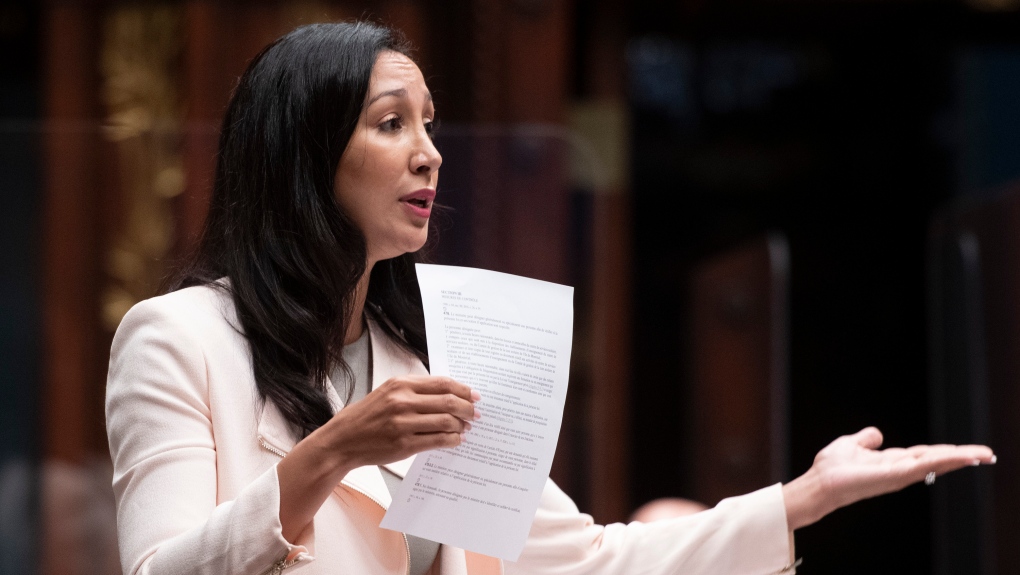Air quality and COVID-19: Quebec Opposition MNA tables bill to install air monitors, purifiers in every classroom
A bill introduced to the national assembly Wednesday would equip every Quebec classroom with an air purifier and sensor that monitors carbon dioxide levels, impose new maximum CO2 concentrations, and make CO2 data available to the public.
Higher levels of CO2 concentrations suggest air isn’t circulating properly indoors, signifying a higher potential for the spread of COVID-19. While the province considers 1,000 parts per million (ppm) to be an ideal target, data presented by the ministry last week suggests 724 classrooms have a weekly average CO2 concentration that exceeds 1,500 parts per million (ppm), while 72 classrooms exceed 2,000 ppm.
Quebec Liberal MNA Marwah Rizqy tabled Bill 192, An Act to ensure student health and safety in the classroom by regulating ambient air quality in schools, with hopes that the national assembly will move quickly to pass it.
“We can work on this bill right now,” Rizqy told reporters in Quebec City.
“The (Parti Quebecois) makes a big deal about King Charles, and now we are able to table a bill within a few days,” she said in reference to Bill 4, which aims to make the King's oath optional and allow PQ members to sit without swearing allegiance to the British monarchy.
Time is of the essence, as it was highlighted earlier this month by Quebec Education Minister Bernard Drainville that carbon dioxide concentrations are likely to rise as the weather gets colder and schools close their windows.
 Quebec Liberal Opposition Education and Higher Education Critic Marwah Rizqy questions the government during question period in this file photo dated Thursday, September 23, 2021. THE CANADIAN PRESS/Jacques Boissinot
Quebec Liberal Opposition Education and Higher Education Critic Marwah Rizqy questions the government during question period in this file photo dated Thursday, September 23, 2021. THE CANADIAN PRESS/Jacques Boissinot
Under Rizqy’s bill, the 1,000 ppm target would become the legal limit. Schools would be compelled to provide weekly reports to the ministry, which would then be made public.
The proposed limit is even tighter during pandemic times, restricting the acceptable limit to 800 ppm until the WHO says the health crisis is over.
"The particles, they are in the air and they remain in the air for 12 to 48 hours," said Nancy Delgrave, scientific coordinator of the COVID-STOP group, who appeared with Rizqy during Wednesday's press conference.
"To reduce the contagion of respiratory viruses, and also to reduce their severity, it is important to treat the air," she said.
A VOW FROM THE FORMER MINISTER
Last year, then-Education Minister Jean-Francois Roberge vowed to equip classrooms with CO2 detectors by the end of the 2022 school year, following concerns over air quality in schools.
At the time, the minister released a letter to directors general outlining his plans to require the readers in libraries, gymnasiums, daycare rooms and other spaces.
CTV News has reached out to the ministry for a status update on the rollout of the devices.
"Laying down a bill at this point is redundant, I believe," said Quebec Provincial Association of Teachers President Heidi Yetman.
She told CTV she would rather the province prioritize classroom repairs.
"We need to make sure the windows are able to open. We have to make sure that we have ventilation," she said.
-- Published with files from The Canadian Press
CTVNews.ca Top Stories

Quebec nurse had to clean up after husband's death in Montreal hospital
On a night she should have been mourning, a nurse from Quebec's Laurentians region says she was forced to clean up her husband after he died at a hospital in Montreal.
Northern Ont. lawyer who abandoned clients in child protection cases disbarred
A North Bay, Ont., lawyer who abandoned 15 clients – many of them child protection cases – has lost his licence to practise law.
Bank of Canada officials split on when to start cutting interest rates
Members of the Bank of Canada's governing council were split on how long the central bank should wait before it starts cutting interest rates when they met earlier this month.
Maple Leafs fall to Bruins in Game 3, trail series 2-1
Brad Marchand scored twice, including the winner in the third period, and added an assist as the Boston Bruins downed the Toronto Maple Leafs 4-2 to take a 2-1 lead in their first-round playoff series Wednesday
Cuban government apologizes to Montreal-area family after delivering wrong body
Cuba's foreign affairs minister has apologized to a Montreal-area family after they were sent the wrong body following the death of a loved one.
'It was instant karma': Viral video captures failed theft attempt in Nanaimo, B.C.
Mounties in Nanaimo, B.C., say two late-night revellers are lucky their allegedly drunken antics weren't reported to police after security cameras captured the men trying to steal a heavy sign from a downtown business.
What is changing about Canada's capital gains tax and how does it impact me?
The federal government's proposed change to capital gains taxation is expected to increase taxes on investments and mainly affect wealthy Canadians and businesses. Here's what you need to know about the move.
New Indigenous loan guarantee program a 'really big deal,' Freeland says at Toronto conference
Canada's Deputy Prime Minister Chrystia Freeland was among the 1,700 delegates attending the two-day First Nations Major Projects Coalition (FNMPC) conference that concluded Tuesday in Toronto.
'Life was not fair to him': Daughter of N.B. man exonerated of murder remembers him as a kind soul
The daughter of a New Brunswick man recently exonerated from murder, is remembering her father as somebody who, despite a wrongful conviction, never became bitter or angry.
































